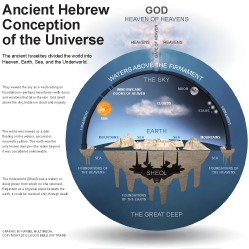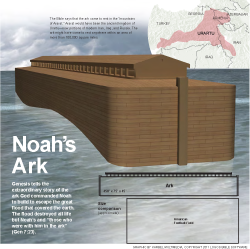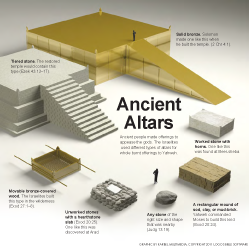8:1–14 After the flood has accomplished its purpose (see 7:22–23), God begins to restore creation. In contrast to God’s act of creation in six days, the waters recede and the earth is restored over a period of five months. |
8:1 God remembered The Hebrew verb used here, zakhar, is often translated “remember,” but in reference to God, it conveys “thought about” or “turned attention to” (compare 19:29; 30:22). God’s purpose for the flood is accomplished, so He turns His attention back to Noah and the ark.
8:2 the windows of the heavens God is reversing the process from 7:11–12. See note on 7:11.
8:3 one hundred and fifty days It is difficult to know how this figure and the one given in v. 4 relate; this is further complicated by difficulties understanding how the calendar in this period of time functioned. See note on 7:11.
8:4 the seventh month, on the seventeenth day See v. 3; note on 7:11.
the mountains of Ararat Refers to a mountain range, not necessarily a particular mountain called Ararat. Ararat was the country or region of Urartu. Assyrian records use this place name for a region that corresponds today most closely with Armenia and Turkey.
8:6 forty days The 40 days parallel the 40 days of rain (Gen 7:12). Compare 7:11 and note.
8:7 he sent out a raven No reason for Noah’s action is given, but the narrative implies that Noah is checking for signs of land and states this explicitly in v. 8 about his choice to send out a dove.
it went to and fro Meaning that Noah allows the bird to fly in and out many times, not that the raven keeps flying until land appears.
8:8 he sent out a dove The dove (yonah in Hebrew) is mentioned 32 times in the ot.
The dove’s first appearance in the ot is here in the flood narrative in v. 8. Doves were classified as clean animals, acceptable for sacrifice (Lev 1:14). Generally, the dove or pigeon was an acceptable replacement for a lamb or other larger animal when the one offering the sacrifice was poor (Lev 5:7). Metaphorically, the dove appears in lament imagery (Isa 38:14; Ezek 7:16), but it is also a symbol of the beloved in Song of Songs (Song 2:14; 5:2). Generally, the dove is associated with beauty, gracefulness, and innocence (Psa 55:6; Matt 10:16). |
8:9 he stretched out his hand and took her Noah likely wanted to check the bird’s feet for evidence of clay, which would indicate land.
8:11 a freshly-picked olive tree leaf The leaf must have come from a plant that had regrown to maturity after some time. Noah now knew that land had reappeared.
8:13 the six hundred and first year The Hebrew text here does not directly state that this figure is in reference to Noah’s life, but that can be inferred from Gen 7:6 and 7:11.
the first The comment that the waters had dried up by the first day of the first month emphasizes the beginning of a new creation. Noah can now see land. Nearly two more months pass before God gives Noah the command to disembark.
8:14 was dry The Hebrew verb used here, yavesh, is related to the noun yabbashah (often translated “dry land”) used in 1:9–10. The words provide a verbal and thematic link between the two narratives, indicating that the restoration of the world after the flood should be understood as an act of divine re-creation.
8:15–22 This passage describes the process of disembarking from the ark, which concludes with Noah offering a sacrifice to Yahweh. Yahweh accepts the sacrifice and promises never to destroy all life by a flood again (compare note on 7:21). |
8:16 Go out from the ark Even though Noah knows that the ground has dried, he waits on the ark until he receives God’s explicit command to leave.
8:17 be fruitful and multiply God’s command that the animals should procreate echoes the command from 1:22. The command will be directed to Noah and his sons in 9:1 (echoing 1:28).
8:19 families The Hebrew term used here, mishpachah, usually denotes human family groups. The word occurs elsewhere with the generic sense of “class” or “type” (Jer 15:3; Job 31:34).
8:20 an altar The first reference to a sacrificial or worship altar in the Bible.
 Altars in the Old Testament Table
Altars in the Old Testament Table
8:21 Yahweh smelled the soothing fragrance This phrase indicates an acceptable offering and appears frequently in the books of Leviticus and Numbers (e.g., Lev 1:9; 2:9; 4:31; Num 15:3).
to himself This choice to never curse the earth again is a deliberate allusion to Gen 6:6–7, where God muses to Himself about the need to destroy humankind.
Never again will I curse The Hebrew term used here, qalal, is different from that of 3:17 (arar), which references the cursing of the ground after the fall.
the heart of humankind is evil An explicit reference to the language of 6:5. God knows that even the flood will not reverse the corruption of the human will and mind.
8:22 As long as the earth endures This wording resolves the tension between the promise of this verse and subsequent descriptions of a final judgment of the world (2 Pet 3:12–13). The final apocalypse will produce a new heaven and new earth. God promises to keep His wrath from humanity until the earth—as it is currently known—is no more (or renewed).

|
About Faithlife Study BibleFaithlife Study Bible (FSB) is your guide to the ancient world of the Old and New Testaments, with study notes and articles that draw from a wide range of academic research. FSB helps you learn how to think about interpretation methods and issues so that you can gain a deeper understanding of the text. |
| Copyright |
Copyright 2012 Logos Bible Software. |
| Support Info | fsb |
 Loading…
Loading…



 Dove
Dove 